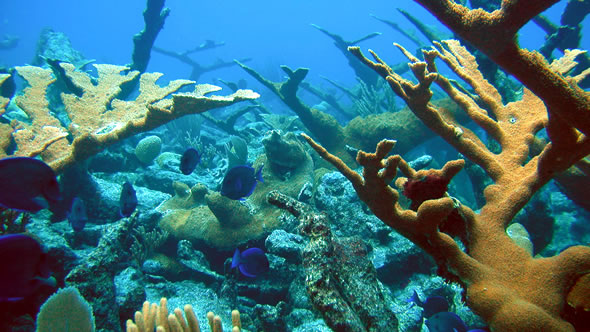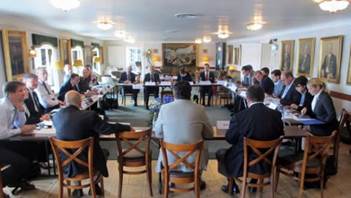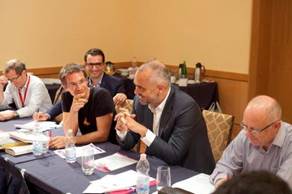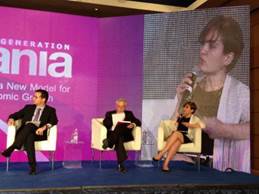Happy Anniversary? EU-Turkey relations at age 50
 |
|
|
Happy Anniversary? EU-Turkey relations at age 50 |
|
- The Ankara Agreement in a changing world
- A rising generation
- It's still visa, stupid
- The EU should (also) speak Turkish
- Reaching out
- ESI in Berlin, Stockholm and Tirana
- Belgrade, Tbilisi, Istanbul and Salzburg
Dear friends of ESI,
Coral reefs are sturdy structures, able to withstand massive waves while hosting some of the richest ecosystems on the planet. They are also the collective product of the efforts of millions of organisms. As Charles Darwin noted in his diaries in 1836, reefs are "the accumulated labour of myriads of architects at work night and day, month after month."
The right political structures are, at their best, similar to such reefs: foundations, developed every day by the efforts of millions of individual architects, creating opportunities for communities and individuals to flourish as they pursue their lives.
On 12 September 1963 leaders of the European Economic Community and Turkey met in Ankara. They signed an Association Agreement – the Ankara Agreement - with the objective "to promote the continuous and balanced strengthening of trade and economic relations between the Parties."
Half a century has passed since 1963 but the institutions then created are still around. The Association Council continues to meet. Economic and trade relations have deepened at an ever accelerating pace. All this has made a difference to the lives of millions of individuals.
The Ankara Agreement in a changing world
In 1963 Turkey was reeling from the consequences of its first military coup and the execution of its first elected prime-minister, Adnan Menderes, which took place less than two years before. It was an overwhelmingly rural and very poor country. The European Economic Community had six members then. Germany was divided, the Berlin Wall just two years old. France was emerging from dramatic confrontations, a long colonial war, a coup attempt in 1961 and Algerian independence. Spain and Portugal were ruled by the dictators Franco and Salazar, while Central and Eastern Europe was in the hand of communist regimes.
In the half century since 1963 regimes have collapsed (fascist, communist, military dictatorships); states have disappeared; borders have been redrawn across the European continent. The EU has continued to grow, from six members with a population of some 170 million to twenty-eight members with half a billion people. Turkey's transformation was no less dramatic. In 1963 the majority of Turks, and the large majority of Turkish women, was illiterate. The average life expectancy stood at 48 years. In 2010 it rose to 74 years. This in itself is an extraordinary change.
While the bonds created in 1963 are solid the EU-Turkey relationship suffers from enduring and deep distrust. This anniversary is a good moment to take stock: where does the Turkish-EU relationship stand today? And where is it going?
A rising generation
On the occasion of this anniversary ESI has published a 50th Anniversary Appeal to help reinvigorate the vision of people-to-people contacts that is at the heart of the Ankara Agreement:
Happy Anniversary? EU-Turkey relations at age 50 – An appeal
The real question today is what the Ankara Agreement will mean to a new generation of Turks, the 31 million people below age 24? It is this generation that will still be around when the Ankara Agreement reaches the ripe old age of one hundred in 2063.
This young generation is the most educated in Turkey's history. 20 million Turks attend school; 3.5 million go to university. The number of pupils attending Turkish secondary schools has doubled in one decade. The number of university students has more than tripled, between 2000 and 2012, from 1 million to 3.5 million.
Turkey today is a society hungry for educational opportunities. In 2010 more than 1.7 million people took the Turkish national university admission exam. Of these only 560,000 were able to enrol. In 2006 Turkey had 93 universities (25 private). In 2010 the number was 166 (now 61 private). The share of education spending in the central budget went from 9 per cent in 2003 to 16 per cent in 2013.
The core idea of the Ankara Agreement is that mobility and interaction lead to prosperity. At the same time, when it comes to people to people contact we find huge, untapped potential to take the EU-Turkey association to a different level.
With the exceptions of some elite universities in Istanbul most Turkish students are still unlikely to meet other Europeans at their own universities. Only 3,500 full time students and another 4,000 Erasmus students, who come only for a few months, are from EU countries in all of Turkey.
The number of Turkish Erasmus students abroad is just one third of the number of French Erasmus students. It is much lower than the number of Erasmus students from (much smaller) Poland.
Most of the current generation of young Turks have no personal experience of the EU. A recent survey found that only one in ten young Turks (age 15 to 29) ever left the country.
It's still visa, stupid
It is paradoxical: the number of Turks travelling abroad increased from 3.5 to 6 million between 2003 and 2012. However, the biggest increases were travellers going to Georgia, Syria, East Asia, Iran and Azerbaijan! So what can the EU and Turkey do?
A lot, it turns out. There are two EU countries which saw a similarly strong increase in Turkish visitors in this period: Greece and Italy. It is no coincidence that Italy and Greece are also countries with very low Schengen visa application rejection rates.
All EU member states should strive to reject as few applicants as possible, emulating Italy and Greece. All should increase the share of multiple-entry visas with a validity of up to five years. In 2011, the share of Schengen multiple-entry visas was only 37 per cent!
The most important step for increasing people to people contacts, however, is to move to full visa liberalisation. As ESI argued in May 2013 in a previous report – "Cutting the Visa Knot. How Turks can travel freely to Europe" – it is today up to Turkey to take the next step to cut the Gordian knot of visa-free travel.
The 50th anniversary of the Ankara Agreement is an appropriate occasion for both the EU and Turkey to get serious about the European idea of free movement– central to the vision of 1963 – and to make it a reality for Turkey's young generation.
The EU should (also) speak Turkish
ESI also appeals to the EU and to the Republic of Cyprus to take a step forward on the issue of Turkish as an official EU language.
EU regulations are clear: any official language of an EU member state can also be an official EU language. Three countries have indicated to the EU that they have more than one official language: Finland (Swedish and Finnish), Belgium (French, Dutch and German) and Ireland (English and Irish).
According to Article 3 of the Constitution of the Republic of Cyprus, Greek and Turkish are even now the country's two official languages.
In early 2004 it was already widely expected that Turkish would soon be added to the list of EU official languages. Cypriot passports contain text in Greek as well as Turkish and English. The Cypriot EU Presidency website had a Turkish version.
All it takes is for Cyprus to put its second official language forward to the EU institutions. This would be one of the most visible and concrete ways to make Turks feel part of the common Europe.
Reaching out
The ESI 50th Anniversary Appeal has a simple message: the best way to commemorate this anniversary is to focus on its future. This means looking to the young generation – in Turkey and in the EU – that will shape the next half century and proposing concrete ideas that highlight the potential in the Turkey-EU relationship.
For this reason ESI is pursuing the Turkey Visa White List Project, supported by Stiftung Mercator.
To help this process we also publish a new analytical manual on the occasion of the 50th anniversary of the Ankara Agreement:
ESI's Who's Who in the Turkey visa debate
We hope this will be of good use to Turkish and other European civil society organisations.
Meanwhile ESI analysts Alexandra Stiglmayer, Lucia Goberna, Nigar Goksel, Ekrem Guzeldere, Katharina Knaus, and junior fellow Julia Edlund continue to work on visa liberalisation, Turkey-EU relations and the other burning reform issues Turkey will need to address.
ESI in Berlin, Stockholm and Tirana
In June ESI organized a briefing at the German Bundestag in Berlin with a number of German MPs on the issue of European values, repression, and authoritarian rule. Why Azerbaijan matters. At this "parliamentary evening" Emin Milli, a blogger and dissident from Azerbaijan, and Gerald discussed how to defend the values of the Council of Europe.
On 10-11 June 2013, ESI and the Jarl Hjalmarson Foundation organized a workshop "Round Table Conference on Political Prisoners and the Council of Europe" in Stockholm, Sweden. In addition to ESI's staff (Alexandra Stiglmayer, Yana Zabanova, Ben Judah and Gerald), the event was attended by experts from the Council of Europe, OSCE/ODIHR, journalists, diplomats and Swedish MPs. See also Rumeli Observer: A Europe without political prisoners? ESI in Stockholm
 |
In September ESI's Besa Shahini and Gerald participated in two events on the Albanian economy in Tirana: a brainstorming with senior international economists and some of the incoming new Albanian ministers, and a public event on the future of the Albanian economy. For more: Rumeli Observer No catching up yet – How Albania and other Balkan nations keep falling behind.
 |
 |
|
|
ESI moderating debates with prime minister Edi Rama and Albanian ministers |
||
Belgrade, Tbilisi, Istanbul and Salzburg
In the next few weeks, ESI analysts will be speaking at events throughout Europe.
Besa Shahini will speak on "Human Security in Kosovo" at the upcoming Belgrade Security Forum, 19-21 September.
In Tbilisi, Alexandra Stiglmayer and Gerald will make presentations at a round table on visa liberalization on 1 October organised by the Georgian Institute for Strategic Studies.
At the 4th Istanbul Forum (3-4 October), Gerald will speak at a panel on "Majoritarianism versus Pluralism: Democracy in Question?"
Gerald will give a key note address at the Policy Leaders' Forum Western Balkans And Turkey in Salzburg (10-11 October) organised by the European Training Foundation.
We look forward to see some of you at some of these events in the near future,
Yours sincerely,

Gerald Knaus
- Happy Anniversary? EU-Turkey relations at age 50 – An appeal (12 September 2013)
- ESI's Who's Who in the Turkey visa debate – Information and contacts (12 September 2013)
- Rumeli Observer: No catching up yet – How Albania and other Balkan nations keep falling behind (5 September 2013)
- Visa White List Project
- Stiftung Mercator
